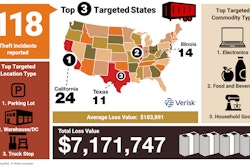
The House of Representatives today passed legislation to avoid a possible strike by freight railroad workers. The House also passed a secnd bill granting workers seven sick days, something that had been a sticking point between the railroads and union members.
The chamber passed the resolution in a 290-137 vote, sending it to the Senate for consideration just over a week before the Dec. 9 strike deadline. Seventy-nine Republicans supported the measure, and eight Democrats voted “no.” The vote on the sick day provision was 221-207, with three Republicans joining all Democrats present in supporting the measure.
The Senate must now take up both pieces of legislation.
Congress has the authority to intervene in railroad labor disputes based on a 1926 law, titled the Railway Labor Act, as a way to prevent disturbances in interstate commerce.
RELATED NEWS: Trucking associations appeal to Congress to act on rail contract talks
The votes come after some 400 business organizations -- including many representing trucking interests -- sent a letter Monday to Congress asking it to intervene in the stalled contract talks. Also on Monday, President Joe Biden also asked Congress to act.
In a statement today, President Biden said, "The Senate must now act urgently. Without the certainty of a final vote to avoid a shutdown this week, railroads will begin to halt the movement of critical materials like chemicals to clean our drinking water as soon as this weekend. Let me say that again: without action this week, disruptions to our auto supply chains, our ability to move food to tables, and our ability to remove hazardous waste from gasoline refineries will begin. The Senate must move quickly and send a bill to my desk for my signature immediately."
The contract applies to 115,000 workers represented by 12 unions.
A tentative contract had been approved in September. It granted workers a 24% compounded wage increase over five years and annual $1,000 lump sum payments. However, there were no paid short-term sick rays in that contract; the unions had asked for 15.
Eight of the 12 unions approved that tentative deal.










